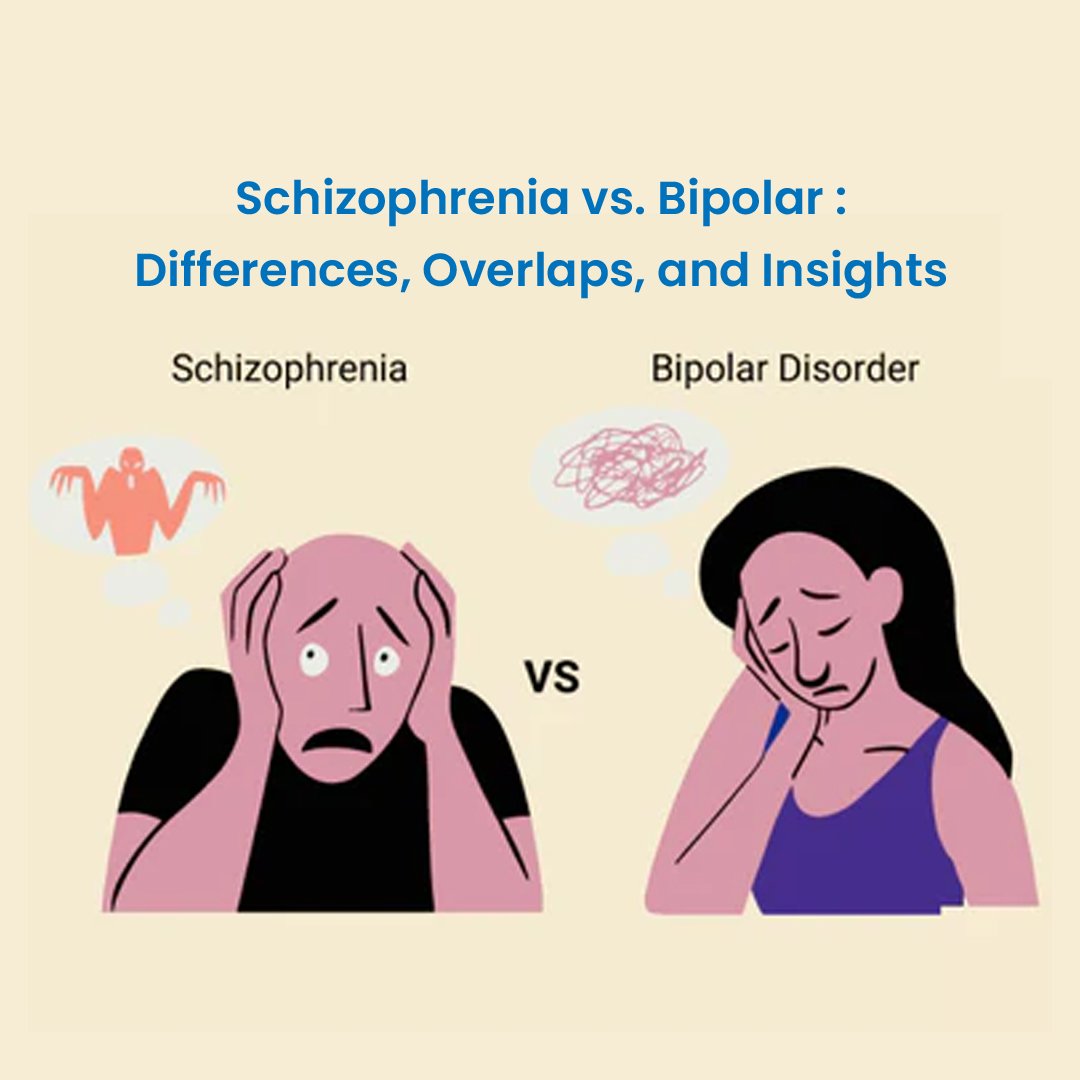
Schizophrenia vs. Bipolar: Differences, Overlaps, and Insights
Mental health conditions like *schizophrenia* and *bipolar disorder* often carry misconceptions due to their complex nature. While these disorders share certain symptoms, they are distinct in their causes, presentation, and treatment approaches. Understanding their differences and overlaps can help individuals and their families seek the right support and care.
### *What is Schizophrenia?*
Schizophrenia is a chronic mental health disorder that affects how a person thinks, feels, and behaves. It is characterized by episodes of psychosis, including hallucinations and delusions.
#### *Key Symptoms of Schizophrenia*:
1. *Positive Symptoms* (Symptoms that add to normal experiences):
– *Hallucinations*: Hearing or seeing things that are not present.
– *Delusions*: Strongly held false beliefs, often paranoid or grandiose.
2. *Negative Symptoms* (Symptoms that take away from normal behavior):
– Reduced emotional expression.
– Social withdrawal and lack of motivation.
3. *Cognitive Symptoms*:
– Difficulty with attention, memory, and decision-making.
Schizophrenia typically emerges in late adolescence or early adulthood and requires lifelong management.
—
### *What is Bipolar Disorder?*
Bipolar disorder, formerly known as manic-depressive illness, is a mood disorder characterized by extreme mood swings between *manic episodes* (elevated mood) and *depressive episodes* (low mood).
#### *Key Symptoms of Bipolar Disorder*:
1. *Manic Episodes*:
– Increased energy, euphoria, or irritability.
– Decreased need for sleep and impulsive decision-making.
2. *Depressive Episodes*:
– Persistent sadness, fatigue, and loss of interest.
– Difficulty concentrating and thoughts of self-harm.
3. *Mixed Episodes*:
– Symptoms of mania and depression occurring simultaneously.
Bipolar disorder can be classified into *Bipolar I, **Bipolar II, and **Cyclothymic Disorder*, depending on the severity and frequency of mood episodes.
—
### *Schizophrenia and Bipolar Disorder: The Overlap*
Although these conditions are distinct, they share some similarities:
1. *Psychotic Symptoms*:
– Individuals with bipolar disorder may experience hallucinations or delusions during manic or depressive episodes, resembling schizophrenia.
2. *Chronic Nature*:
– Both conditions require long-term management through therapy, medication, and lifestyle adjustments.
3. *Impact on Daily Life*:
– Both disorders affect relationships, work, and overall quality of life.
4. *Genetic Predisposition*:
– Family history of either disorder increases the likelihood of developing it.
—
### *Key Differences Between Schizophrenia and Bipolar Disorder*
| *Aspect* | *Schizophrenia* | *Bipolar Disorder* |
|————————–|———————————————|——————————————|
| *Primary Symptoms* | Psychosis (hallucinations, delusions) | Mood swings (mania, depression) |
| *Onset* | Late teens to early 30s | Late teens to mid-20s |
| *Cognitive Impact* | Severe impact on memory and thinking | Less pronounced but present during episodes |
| *Mood Changes* | Not central, but emotional flatness common | Central feature with manic and depressive phases |
| *Treatment Focus* | Managing psychosis | Stabilizing mood swings |
—
### *Causes and Risk Factors*
1. *Genetics*:
– Both disorders have a hereditary component.
2. *Brain Chemistry*:
– Imbalances in neurotransmitters like dopamine and serotonin play a role.
3. *Environmental Factors*:
– Early-life trauma, stress, and substance abuse can increase risk.
4. *Medical Conditions*:
– Certain illnesses or injuries may trigger or exacerbate symptoms.
—
### *Treatment Approaches*
1. *Medication*:
– *Schizophrenia*: Antipsychotics are the primary treatment.
– *Bipolar Disorder*: Mood stabilizers (like lithium) and antipsychotics manage mood swings and psychosis.
2. *Therapy*:
– *Cognitive Behavioral Therapy (CBT)* helps manage thought patterns.
– *Psychoeducation* empowers individuals and families to understand the disorders.
3. *Lifestyle Changes*:
– Regular exercise, a healthy diet, and adequate sleep improve symptoms.
– Stress management through mindfulness or relaxation techniques is beneficial.
4. *Support Systems*:
– Support groups and community resources provide emotional and practical assistance.
—
### *Coping Strategies for Patients and Families*
1. *Early Intervention*:
– Prompt diagnosis and treatment improve outcomes.
2. *Medication Adherence*:
– Regular use of prescribed medication prevents relapses.
3. *Building Routines*:
– Structured daily routines help stabilize mood and reduce stress.
4. *Open Communication*:
– Families should encourage open conversations and create a supportive environment.
—
### *Conclusion*
Schizophrenia and bipolar disorder are complex but manageable conditions. Understanding their unique features and shared traits is essential for effective treatment and support. With proper care, individuals with these disorders can lead fulfilling lives. If you or someone you know is experiencing symptoms, seek professional help early to begin the journey toward recovery.
